Wednesday, May 31, 2017
As we look back over the past four decades at what made toll-free great, there were three prime movers:
- Personal service
- Free Calling
- Instant commerce (relative to the alternatives of its day)
When long distance calls were expensive, "free calling" was accomplished through reverse billing -- the receiving party paid toll -- hence the name "toll-free." Essentially, merchants enticed customers to engage with them by offering "toll free" calls, which they gladly paid for in exchange for potential business.
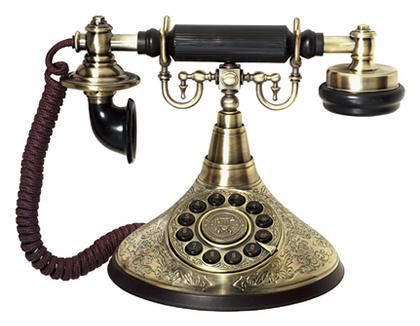 That was also at a time when the only quick, personal way to place an order was by phone, averting impersonal catalog ordering by mail and later by fax.
That was also at a time when the only quick, personal way to place an order was by phone, averting impersonal catalog ordering by mail and later by fax.
Today, two of these prime movers are gone. "Instant commerce" is best accomplished via a website and calling is so cheap in North America that the benefit of "free calling" is incidental. Clearly the term "toll-free" is antiquated. Even if cell phones became truly "toll-free," that would have little impact now that even wireless calls are just pennies a minute.
Of the three original prime movers, only personal service endures to this day, but that's a very big deal.
Today's darling, Internet commerce, remains impersonal and self-guided, despite the addition of time-shared chats and the cutesy welcome videos by actors who seem to walk across the screen.
 While it's generally quicker to order on-line-- partly because you can dispense with the pleasantries of a live conversation-- you have to know exactly what you want!
While it's generally quicker to order on-line-- partly because you can dispense with the pleasantries of a live conversation-- you have to know exactly what you want!
Even your questions are typically self-guided, as you are left to hunt your own answers among the FAQs or in some "knowledge base." In effect, websites are little more than a real-time versions of a 1960's catalog with dynamic, visual content.
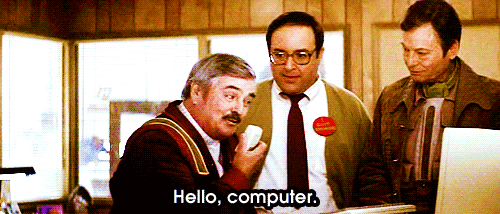
In this scene from Star Trek IV, Scotty, an spaceship engineer from the future, first encounters a modern-day computer -- and talks to it!? In that instant he discovered what we've all but ignored: there's nobody "in there."
The Inernet is just a big vending machine! Indeed, only someone from outer space would expect personal service from a computer or, by extension, a website!
In contrast, the expectation of a phone call is that you'll connect with and get personalized service from a live, human being-- and when we don't, we're frustrated!
Think about it. Would you ever say out loud to a customer: "Hey, I don't have time you. Go talk to my computer"-- especially now that you realize they are sure to have a Scotty moment? No way!
Yet, that's precisely what we're doing when we just advertise our web address and not our toll-free numbers. When we need real human interaction, we all know what to do: pick up the phone!
Ally Bank has made great fun of this reality by portraying competitive bank websites as soulless robots, while they offer real human service, 24/7 by phone, e.g. "A machine can't give you what a person can." ... And that's precisely why toll-free creates an enduring, competitive advantage.
Human interaction is not just a luxury; it's savvy business too. For example:
- The founders of Hotels.com discovered their closure rates were 26 times higher, or 2,600%, by phone than by Internet, and built their new company Get A Room.com around that fact.
- Zappos built their company on personal service. The fact that they sell shoes is almost incidental. Their real product is personal service.
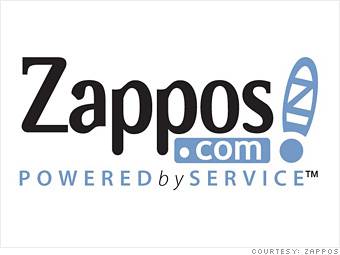 These are not success stories form the 1980's; these are a "reality check" from the post-Internet age.
These are not success stories form the 1980's; these are a "reality check" from the post-Internet age.
The phone-- not the Internet -- is the high ground of remote sales and customer service, because we can convey more of ourselves by voice than we will ever express on a web page—aside from that visual thing!
Okay, so we humans are amazing, but is that all there is? Personal service? Will the Internet just envelope that too with the eventual addition of video telephony?
New Prime Movers
Beyond Personal Service, three new prime movers have emerged over the decades since toll-free was launched:
- Universal Appeal
- Caller Number
- Privacy by Law
The first new prime mover in toll-free is universal appeal.
Universal AppealThe proliferation of countless new area codes has made the
universality of toll-free numbers a primary advantage, especially the more familiar 800 and 888 numbers.

In any given location, multiple area codes and overlays have been deployed with a confusing array of exchanges in various stages of functionality. Just look at hodgepodge of New York area codes!In addition, when you use a local number its area codes will
always be tied to some geographical area and, for example, 212 will remain associated with New York; 312 with Chicago, 202 with Washington DC; 310 with LA; and many, many others for decades to come. In contrast, when you advertise toll-free, you are anyplace and everyplace at once! Many areas require 10-digit dialing anyway, so using one, toll-free number gives you universality.
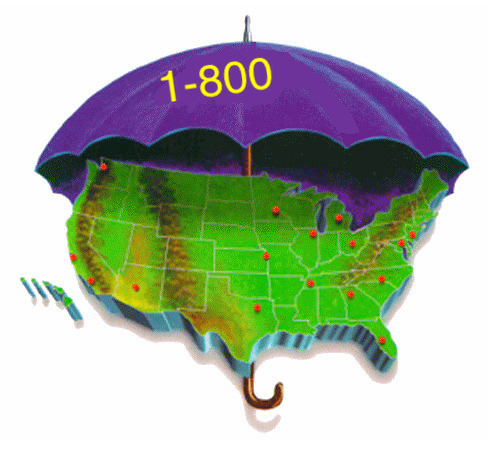
Caller Number
The second prime mover in the renaissance of toll free is automatic number identification (ANI, pronounced like “Anne”). Think of ANI as un-blockable Caller ID, which facilitates a very significant feature of toll-free, number identity.
When toll-free was conceived, ANI was logged in the network and batched into a monthly call report to reconcile billing, but over the years these systems have evolved to where number identity has become available in real-time.
 On toll calls, Caller ID is blocked at the network entry point, as only the primary carrier needs to know the caller’s number for billing purposes, e.g. think of your monthly cellular bill. Beyond that, callers are anonymous.... Or, are they?
On toll calls, Caller ID is blocked at the network entry point, as only the primary carrier needs to know the caller’s number for billing purposes, e.g. think of your monthly cellular bill. Beyond that, callers are anonymous.... Or, are they?
In contrast, when the called party pays toll, anonymous calling is prohibited and ANI travels with the call -- even when Caller ID is blocked at the source. The host carrier “sees” the ANI of every call placed to its toll-free numbers, regardless of the unique path the call takes through the network among the hundreds of carrier participants.
If you want to see ANI in action, there’s a rogue app -- currently banned by Apple -- that unmasks anonymous calls, called TrapCall. It works by forwarding anonymous calls -- calls with Caller ID blocked -- to a toll-free number so that TrapCall can expose the ANI. The call is then returned to your phone unmasked-- with the real phone number revealed.
Like any powerful tool, ANI can be used for good or evil. Real-time ANI has allowed two powerful services to emerge: call routing and caller lookup.
Company’s like Telesmart and Paetec (formally McLeod) use ANI to route calls on a granular level. For example, calls can be routed in real-time – with continuous updates – on DMA, county, area code, or ZIP code, using the geo-location of the callers number.
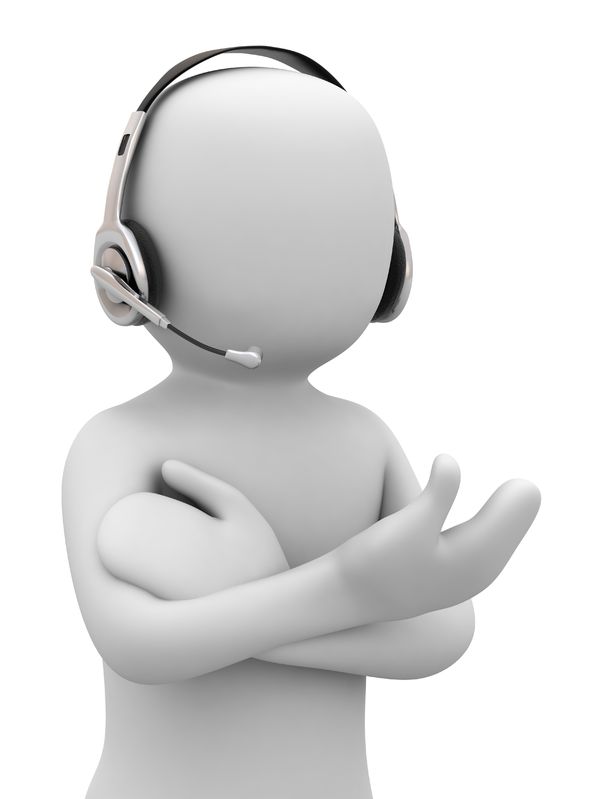 Beyond routing, the number identity can often be cross-referenced with public – and not so public – records, which can often match the caller’s actual identity, i.e. caller look-up. Most routing services allow for this, but companies like Who’s Calling specialize in caller identity as a sales tool.
Beyond routing, the number identity can often be cross-referenced with public – and not so public – records, which can often match the caller’s actual identity, i.e. caller look-up. Most routing services allow for this, but companies like Who’s Calling specialize in caller identity as a sales tool.
Auto dealerships, for example, may instantly learn your name, address, and demographics as you call in on one of their toll-free numbers. No such service is available when you advertise local numbers. This toll-free feature alone creates a powerful business advantage.
Privacy by Law
Finally, we're convinced that privacy protection will emerge as the most important prime mover.
Number identity is not caller identity, unless the caller is already known to be associated with a number used in public records or in previously shared data. Even then, Number Identity is only available to the called party, not to 3rd parties, the public, or other marketers.
In the on-line world, this would equate to nothing more than a search for a user name associate with a "from address." Yet, unlike the on-line world, the contents of your phone conversations is protected by law.
Thanks to a 1920’s bootlegger and a 1960’s bookie, the right to telephonic privacy is now settled law; your lines cannot be wiretapped without a court order; your phone records cannot be disclosed to 3rd parties; and your conversation cannot be recorded without your consent.
The PBS documentry "Whispering Wires" documents how a police lieutenant, turned bootlegger, paved the way to telephonic privacy.
Watch Whispering Wires The Good Bootlegger on PBS. See more from Prohibition.
This protection was extended in the 1960's to conversations held in a public phone booth when, simply by closing the door, you have constitutionally protected right of privacy. Even your own phone company is required to ask for permission to use your phone records to discuss service upgrades – the very records they keep for you!
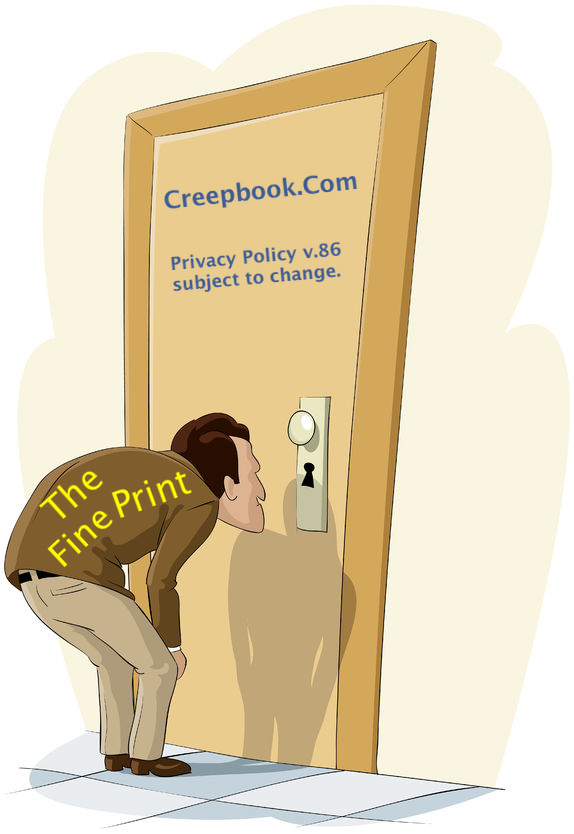 And remember TrapCall, the rogue service that unmasked Caller ID? The legal issue appears to be that the caller has an expectation of privacy when they block their Caller ID and dial a local number -- and that privacy is lost when calls are re-routed to TrapCall.
And remember TrapCall, the rogue service that unmasked Caller ID? The legal issue appears to be that the caller has an expectation of privacy when they block their Caller ID and dial a local number -- and that privacy is lost when calls are re-routed to TrapCall.
In contrast, all the legal protections we're come to expect on a phone call are generally absent when you visit a website, email, or submit data into on-line form. Whatever privacy you may be afforded is by policy, not by law. Websites like Facebook, Google, and others are constructing dossiers on their users for marketing purposes.
The Federal laws that protect privacy on a phone call may be bypassed with one-party consent; "consent" by the offending websites themselves has been ruled sufficient to track any and all visitors!
On-line, the major frustration going forward is not your privacy but that the biggest offenders -- those data aggregrators with the most market power -- will not pool private data, resulting in on-line profiles being kept like "walled gardens."
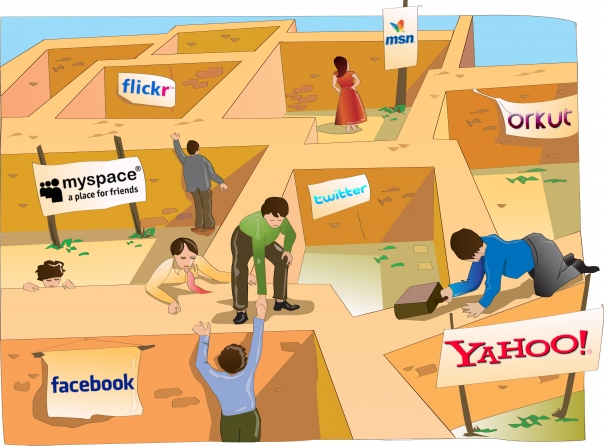
The expectation of privacy is at the crossroads of two different worlds. One dominated by privacy, the telephony world, where you only disclose personal data on a need-to-know basis; One dominated by identity stripping, the world wide web (WWW), where your personal data is methodically collected from every action and reconstructed into a persona used to create ad spam and even restrict or enhance what's visible to you on-line.
 In one world, disclosure to 3rd parties would be a shocking violation of your privacy: “Hey look at this stupid ad! Why are the sending me deals on Pampers. OMG!.. They know I’m pregnant!!??
In one world, disclosure to 3rd parties would be a shocking violation of your privacy: “Hey look at this stupid ad! Why are the sending me deals on Pampers. OMG!.. They know I’m pregnant!!??
In the other world, an ever-present Big Brother: “Hey look at this stupid ad. Why are the sending me deals on Pampers when they know I like Huggies!”
Facebook, for example, is like a popular nightclub. Rather cool. Well populated. In 2012, it may be the in place to be!
Yet, who would hang out in real nightclub with dozens of cameras in every room, with every moment being recorded and personified; paparazzi and friends everywhere, posting photos in real time of your every move? Of course, if you are seeking the limelight, Facebook is the main stage. But when you're seeking privacy, there's nowhere to hide.
Websites like Facebook only remain popular, in our view, because there is nowhere else to go that is functionally equivalent with superior privacy protections. Currently, loss of privacy is the price you pay to play on these "free" websites.
The Missing Link
So, does toll-free have a future, or will it remain a niche media forever, like radio has become after the advent of TV? Are the costs of human interaction just too high to create a competitive advantage? Will there be a return to privacy or should we just "get over it," as Scott McNealy famously said.
There’s only one thing conspicuously missing from the telephony world; one thing that would put 1-800-Flowers on par with 1-800-Flowers.com: visual interaction. While you can talk to real human beings when you call, you still can’t see a thing!
So, what happens next will be amazing!
Stay tuned...
]]>